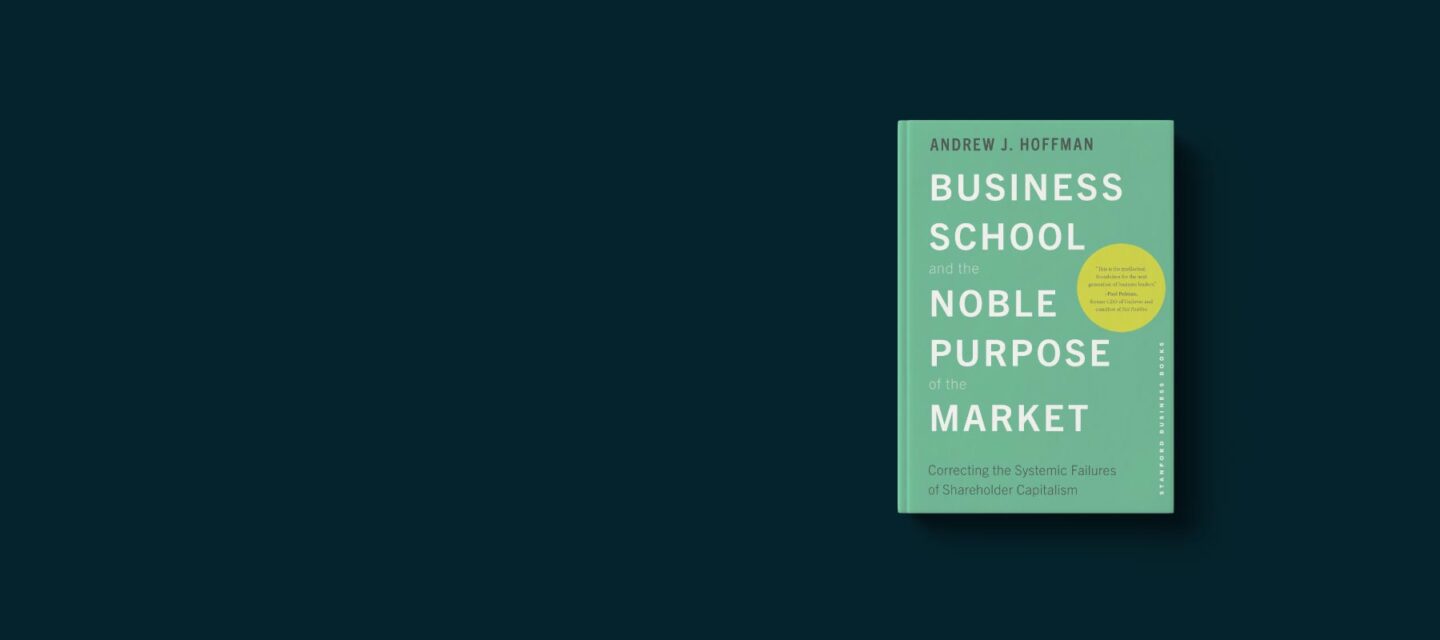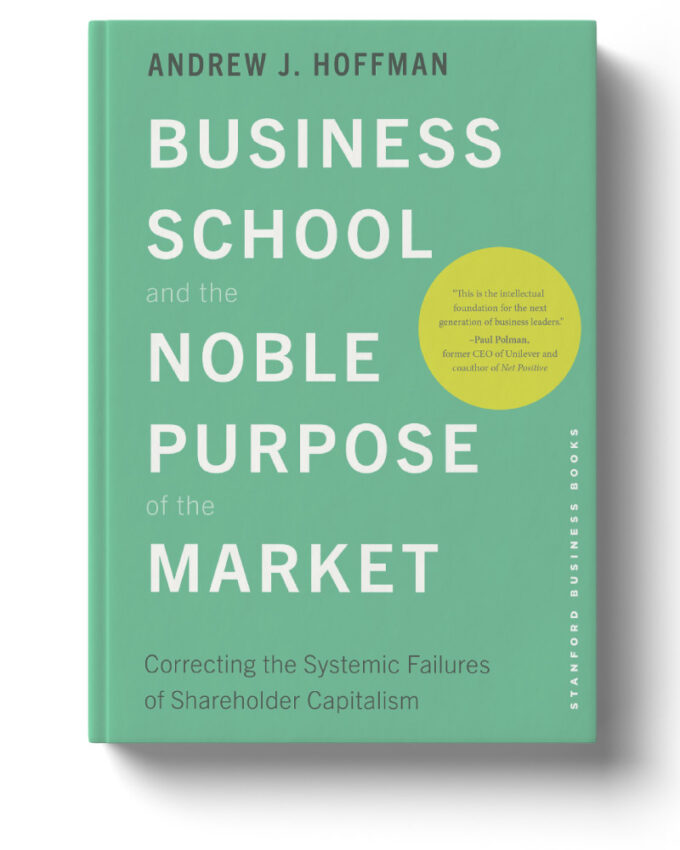
Holiday reads to challenge and inspire
From dystopian novels to a guide on public speaking, IMD professors share six of the books they have enjoyed this year....

by Andrew J. Hoffman Published April 8, 2025 in Leadership • 11 min read
The time has come to rejuvenate intellectually and morally the training of our future business leaders.- Rakesh Khurana, Harvard University

Business schools were designed for a world that no longer exists, one that elevated the primacy of shareholder profits above the interests of employees, the environment, or broader society. One that viewed government more as an intrusion on the free market than an arbiter of its proper functioning and promoted unlimited growth despite the physical, environmental, and economic limitations on such a goal. Given this, (primarily Western) business schools are not preparing future leaders with the skills, knowledge, and wisdom to deal with challenges such as climate change and widening income inequality. It is time to rejuvenate the business school curriculum to turn the power of business and the market toward a role that is more consistent with its place in society.
The market, comprising business, government, civil society, and others, is the planet’s most powerful set of organizing institutions, and business is the most powerful entity within it. The past 150 years of capitalism have been tremendously successful in addressing society’s problems. It raised the standard of living for billions of people by increasing the world economy by a factor of 14, tripling the global per capita income, extending average life expectancy by almost two-thirds, and reducing the number of people living in extreme poverty from 56% in 1920 to 10% today.
This advance in prosperity is mainly due to advances in medicine, shelter, food production, and other amenities brought about by the market. Businesses will continue to play a role in addressing humanity’s challenges, but it’s unclear whether it will be a positive one. Businesses hold enormous powers of ideation, production, and distribution to provide solutions to society’s problems, yet they also have the potential to multiply the effects of the darkest human impulses and result in exploitation and greed.
There is an urgent need to nurture a new breed of business leaders who view business as a vehicle to serve society.
There is an urgent need to nurture a new breed of business leaders who view business as a vehicle to serve society. As Hubert Joly, former CEO of Best Buy, writes in his book The Heart of Business, it is time to reconnect with the noble purpose of business and bring about the “next era of capitalism.”
Leaders who take this path should be aware of the shortcomings and ethical dilemmas inherent in today’s capitalism. They should see it as their duty to guide this system toward a more equitable model that better responds to the challenges of the 21st century. Business schools are currently not producing enough of these leaders.
Capitalism is encountering critical issues that it is ill-equipped to tackle. Humanity stands at a pivotal juncture. The rise of artificial intelligence, forced labor, poverty, conflict, and the threat of nuclear weapons are all key concerns. But here, I will focus on climate change and wealth inequality.

Inequality and climate change are systemic failures resulting from choices in how those in power structure the market. Collectively, we can amend the rules of capitalism to allow it to tackle these mega challenges. Capitalism is not an immutable law of nature. It is a system designed in the service of humans and can evolve when those interests are no longer served. It’s neither static nor uniform and has shown flexibility in responding to various challenges. The emergence and regulation of monopoly power, the successful tackling of ozone layer depletion, the reduction of water pollution, and the mitigation of acid rain demonstrate this adaptability. The question is how capitalism will be reformed to meet the challenges of climate change and inequality by those in power.
The reform will need to be significant. The present system of shareholder capitalism – alternatively referred to as market fundamentalism or the neoliberal doctrine – must be amended into a new form in which the corporation seeks to provide value to society and not to enrich the few. New guardrails in the market will be needed to prevent the endless pursuit of economic growth, the view of nature as a limitless source of materials and sink for wastes, and the mindless consumption that drives it all.
For that to happen, we need a new kind of business leader, one focused on mastering the domains of commerce while also recognizing that they have a responsibility to maintain the integrity, stability, and equity of the system in which they operate. As Colombia University economist Joseph Stiglitz argues, their emphasis will need to move away from “wealth extraction … trying to steal a larger fraction of the economic pie” and toward “wealth creation … a recognition of the true sources of wealth of a country and the ability to get wealthy by creating wealth and contributing to society.” This is where business education enters the picture.

“Simply adding electives while the curriculum remains focused on shareholder profits will not address the scale of the challenge.”
Many business schools in the US, Europe, and elsewhere have added climate change to their curriculum. However, the guiding motivation is the business opportunity that climate change presents in the form of new products, services, and practices that address the climate challenge. Selling climate solutions is an important first step, but it will only slow the velocity at which we are heading toward system collapse.
Simply adding electives while the curriculum remains focused on shareholder profits will not address the scale of the challenge. Business schools have focused on “expanding the pie” or “win-win” solutions to addressing climate change. They ignore the more difficult (and more interesting) “win-lose” scenarios.
For example, how can we bring about an orderly transition to a carbon and fossil-fuel-free economy? It is insufficient to hope that new energy sources and forms of carbon capture technology will emerge to make the transition frictionless. The most likely scenario is a transition that will be painful for businesses and consumers. For instance, switching to renewables will require up-front investments. While utilities will likely bear the costs, they will be passed on to consumers.
Business schools are missing an opportunity to force their students to tackle these challenging truths head-on. Business education has ossified into outdated ideas and models. The MBA has become a “product” fixated on 50-year-old notions of shareholder primacy and a variant of the “greed is good” mentality.
Students are taught to make “the business case” and gain market advantage when addressing climate change while giving limited attention to the fact that it’s an existential threat to life on earth or the moral reality that it is rich nations that are primarily responsible for climate change and poor ones that will feel its effects hardest.
Making only a business case around climate change is absurd and sociopathic.
Corporate lawyer James Gamble warns that the business case emphasis compels business leaders “to act like sociopaths,” running their companies as “textbook case[s] of antisocial personality disorder” in which the company “is obligated to care only about itself and to define what is good as what makes it more money.” In an era of record fossil-fuel extraction and climate change impacts, what else can explain oil industry executives using company resources to spread misinformation about climate change?
What can explain a multinational pharmaceutical company increasing profits by aggressively promoting a product that has killed over 450,000 people and addicted countless more? And what can explain a former hedge fund manager acquiring the rights to a 62-year-old drug and then raising the price from $13 to $750 per tablet because people need it to treat a life-threatening parasitic infection? The answer lies in a thirst for profits over responsibility to society.
Business journalist and writer Duff McDonald excoriates business schools for fostering such thinking, writing that the business curriculum is devoid of normative viewpoints, “has always cared less about moral leadership than career advancement and financial performance”, and, as a result, creates “a generation of corporate monsters” who lack “a functioning moral compass.” This is harsh, but I think even the most committed B-school faculty would wince in a moment of self-recognition at McDonald’s description.
Students are taught the rational skills of profit maximization, but schools must also attend to the pride of craft, developing valuable products and services that their customers want and need without harming society and the environment.
Business education teaches valuable tools of management – the how of business found in the core curriculum of strategy, accounting, finance, operations, and organizational behavior. To bring its content into line with 21st-century realities, this core curriculum must be augmented to focus on why those tools should be deployed. That augmentation begins by acknowledging the elevated power that business leaders possess to shape and guide society and instill the sense of responsibility that comes with that power. Students are taught the rational skills of profit maximization, but schools must also attend to the pride of craft, developing valuable products and services that their customers want and need without harming society and the environment. This involves teaching to their entire self, cultivating the virtues of wisdom, character, and purpose. As Rakesh Khurana, of Harvard Business School, said, “The time has come to rejuvenate intellectually and morally the training of our future business leaders.”
The time is right for a transformation of business education. The host of problems facing the business world are clarifying the need for change. However, the only way that businesses and the market can fully respond is to shift their orientation from wealth extraction to wealth creation at a very deep and systemic level. As the economist Joseph Stiglitz writes, “The neoliberal fantasy that unfettered markets will deliver prosperity to everyone should be put to rest.”
There are signs that business is at least trying to respond. The Business Roundtable and World Economic Forum have tried to redefine corporate purpose to think beyond shareholders and include all stakeholders in society. Former Unilever CEO Paul Polman and the management thinker Andrew Winston are calling on business leaders to be “net positive,” a term they use to describe a business venture that “improves well-being for everyone it impacts.”
BlackRock CEO Larry Fink has stated that the effort to adjust investing in this direction “is not about politics. It is not ‘woke’. It is capitalism.” The backlash to Fink’s position highlights the extent to which some may see these efforts as an attack on capitalism. But they are quite the opposite. They are efforts to amend and reform capitalism, to bring it back in line with the needs of society that have evolved greatly since the 1970s when our present variant emerged and took hold. It is time for business schools to step up to the challenge – to engage in these debates and help bring about an evolved form of capitalism that serves society’s needs in the 21st century. We need to recognize that we are still working on a model that is no longer relevant and fundamentally alters our teaching pedagogy and research focus accordingly. There are glimpses of that change occurring, from alterations in faculty reward systems to encourage more socially relevant research to course innovations that speak to the challenges our students will face.
I am advocating for a pivotal shift in business education from guiding students on managing businesses for personal gain to educating them on managing both prosocial businesses and a market in which they will operate – activities that will incidentally result in personal gain. My proposals are transformational, not incremental, as transformation is what is needed. But it also recognizes that transformation invites resistance and rigidity.
This article is adapted from Business School and the Noble Purpose of the Market by Andrew J Hoffman (Stanford Business Books). The book is available to order here.

Holcim (US) Professor of Sustainable Enterprise at the University of Michigan
Andrew J. Hoffman is the Holcim (US) Professor at the University of Michigan’s Ross School of Business. His work has been covered in The New York Times, Scientific American, Time, Wall Street Journal, Atlantic, and National Public Radio. He has published six previous books with Stanford University Press, including How Culture Shapes the Climate Change Debate (2015) and, most recently, Management as a Calling (2021).

December 6, 2024 • by John R. Weeks, Susan Goldsworthy, José Parra Moyano, Katharina Lange, Howard H. Yu, Öykü Işık in Books
From dystopian novels to a guide on public speaking, IMD professors share six of the books they have enjoyed this year....
Explore first person business intelligence from top minds curated for a global executive audience